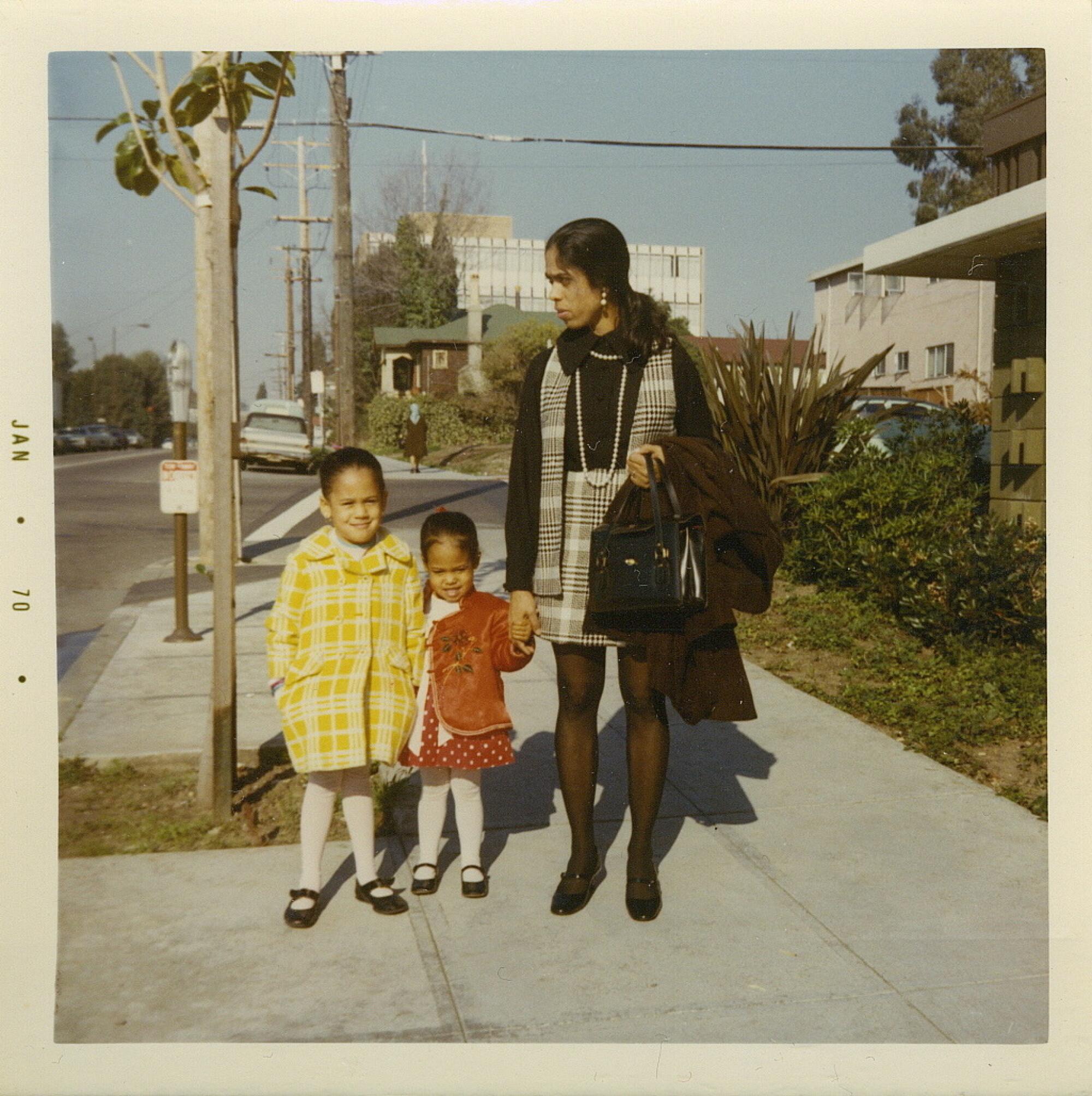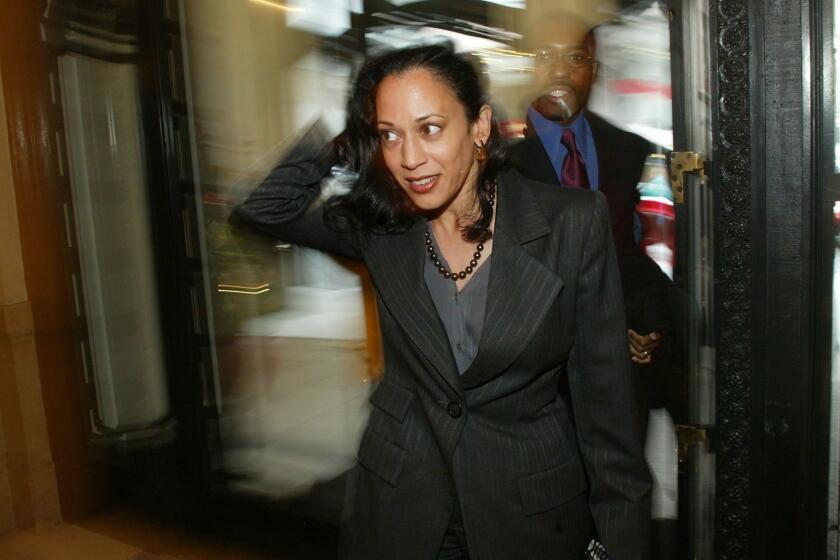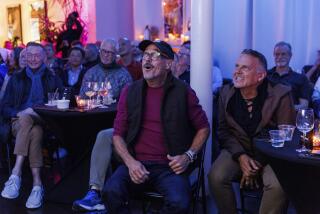
Wearing a T-shirt that reads “First but not the last” — a phrase Kamala Harris has used to describe herself as the country’s first female vice president — a 9-year-old named Violet stood outside her elementary school, one the Democratic nominee once attended, and worried about the future if former President Trump is elected next month.
“It’s scary how abortion could not be a thing anymore,” said Violet, who won’t be eligible to vote for nearly a decade.
A lot has changed since Harris, 60, was a little girl growing up in Berkeley, but progressive activism remains central to the city’s DNA and for many is a normal part of childhood. The liberal Bay Area city, known for its hippie counterculture, free speech and anti-war movements, helped shape Harris early on.

Harris’ ambitions bloomed at Thousand Oaks Elementary, where she was among the first bused to a new school as part of Berkeley’s voluntary desegregation program while other parts of the country resisted merging districts.
“Because the students came from all over the area, we were a varied bunch; some grew up in public housing and others were the children of professors,” Harris wrote in her 2019 memoir, “The Truths We Hold.”
Just minutes from the famed UC Berkeley campus, nestled on a quiet street near a charming plaza home to vegan cafes and “zero waste” shops, the Thousand Oaks Elementary schoolyard features a colorful mural of alumna Harris and other barrier-breaking women. As a group of girls danced to TikTok trends on a clear blue day earlier this month, fourth-grader Arie Van Trump was quick to clarify that she is “NOT related to any presidents.”
“I think it’s just really cool to just be in a place where it’s like: Everyone unite, Black lives matter, and all this stuff,” she said of the hometown she shares with Harris.
In between learning lessons on California’s missions and Ruth Acty, Berkeley’s first Black teacher, Van Trump has heard concerns from her classmates about Project 2025. She is rooting for Harris, hopeful for more humane solutions to immigration and homelessness.
“I hope she makes history by becoming the president. It would be like showing the other countries we’re ready to not be racist or sexist,” the 9-year-old said.

Harris has described her formative years living in a Berkeley duplex as an ideal place for a child of immigrants and an influential introduction to Black leadership.
Her parents had come to Berkeley from abroad — father Donald Harris from Jamaica, and mother Shyamala Gopalan from India; they “met and fell in love” at the university “while participating in the civil rights movement,” Harris wrote in “The Truths We Hold.”
She describes her mother’s life-changing experience watching outspoken activists on soapboxes on UC Berkeley’s Sproul Plaza; marching alongside protesters of the Vietnam War and hearing Martin Luther King Jr. speak.
Harris spent many of her early days at the Rainbow Sign, a Black cultural center in Berkeley where singer Nina Simone performed when she was 7 years old, and where famous authors Maya Angelou and Alice Walker held book signings.

It was there that the future vice president “could begin to imagine what future might hold she wrote.
“It was a citizen’s upbringing, the only kind I knew, and one I assumed everyone else was experiencing, too.”
Berkeley is “where it all began” for Harris, said Aaron Peskin, a member of the San Francisco Board of Supervisors who is running for mayor. Peskin was classmates with Harris at Thousand Oaks Elementary. A black and white photo in her memoir shows him sitting, legs crossed, in their first-grade classroom near a tiny Harris wearing pig tails.
His mother, an Israeli immigrant who railed against Ronald Reagan at the family dinner table, formed a special friendship with Harris’ mother, he said.
“A lot of that seminal, really important American activism initiated out of Berkeley and San Francisco,” Peskin said.
Peskin reconnected with Harris in August when she stopped at a swanky fundraiser at the Fairmont Hotel in San Francisco. He caught her eye and she waved him over, he said. Secret Service agents made a path, and they exchanged a hug.
“I thought to myself, ‘How cool is this?’” he said. “My kindergarten pal.”
Before she was the Democratic presidential nominee, Kamala Harris took actions as California attorney general, San Francisco district attorney and courtroom prosecutor that have left lasting impacts on some, for better or worse.
State Sen. Nancy Skinner (D-Berkeley) was another politician molded by the passionate city. She moved there from Palos Verdes in the 1970s to study environmental science at the university and said she had no political ambitions. But soon, she was drawn in by the fight over Roe vs. Wade and was convincing others to vote for Shirley Chisholm, the first Black person to run for a major party’s presidential nomination.
“There was this fervor, this pride, a deep discourse” said Skinner, who before being elected to the California Legislature had served on the Berkeley City Council while still a student. “Growing up I didn’t even know who my congressman was, and now everywhere you went there were signs about political forums and recruiters trying to get you to register to vote or walk precincts.”

Harris has not exactly embraced the far left city (where just 3% of voters are registered Republicans) as she aims to appeal to moderate swing-state voters in the high-stakes presidential election. But Berkeley has certainly embraced her.
Campaign signs for Harris and running mate Tim Walz are everywhere. Websites for the Berkeley school district and the city’s tourism bureau have pages honoring Harris’ childhood here. And many tout long-ago connections to the history-making presidential candidate.
Skinner once lived on Bancroft Way, just a few blocks from Harris’ yellow painted childhood home, which city officials have considered making an official landmark.
Berkeley City Councilmember Ben Bartlett said Harris once babysat him when she was in junior high while he spent time at his aunt’s house in Oakland.
When Kamala Harris looks back on her first campaign, a run for San Francisco district attorney, she remembers a brutal awakening.
Bartlett’s story is quintessential Berkeley: He said his mother was an early member of the Black Panther Party, the radical political group that disbanded decades ago; his father was a social justice advocate who fought for affordable housing and his uncle was the groundbreaking U.S. House Rep. Ron Dellums of California.
“It’s a very community-oriented place, so you can talk politics on the sidewalk with people. And we do, we definitely do,” Bartlett said. “All of us have contributed to this place as being a place of freedom.”
Standing outside Harris’ former elementary school earlier this month, a gaggle of informed fourth-graders were ecstatic about the possibility that one of their own could be the nation’s first female president.
“We’re all feminists, right?” one girl asked to resounding nods. Another corrected her classmate’s pronunciation of the candidate’s first name.
Emmie Feeley, who was wearing a Thousand Oaks Elementary T-shirt and dangling yellow duck-shaped earrings, recently wrote Harris a letter.

Emmie’s neighbor had told her that he was Harris’ art teacher when she was around her age, she wrote in pencil to the politician, saying: “You are my hero,” and “Ever since I was five, I’ve been looking up to you.”
Emmie told Harris in the letter that she’s a pescatarian and likes to bake. But the girl had carefully weighed whether to mention that she’s Jewish. She knows that Harris’ husband, Second Gentleman Doug Emhoff, is Jewish, too, but she worries about antisemitism.
“If the letter accidentally got dropped somewhere on the way to the White House or wherever she lives. ... what if it got in the wrong hands?” she wondered.
Emmie told Harris anyway. She has a plan to make sure the letter grabs her attention: She’s going to color it hot pink and neon green so that it stands out from all the other mail the vice president receives, presumably in boring white envelopes.
“I hope that she can help people that need it the most — people who are sick, people who don’t deserve to be in jail. And can protect the environment and animals,” the girl said, envisioning a President Harris. “Especially penguins.”
More to Read
Sign up for Essential California
The most important California stories and recommendations in your inbox every morning.
You may occasionally receive promotional content from the Los Angeles Times.













